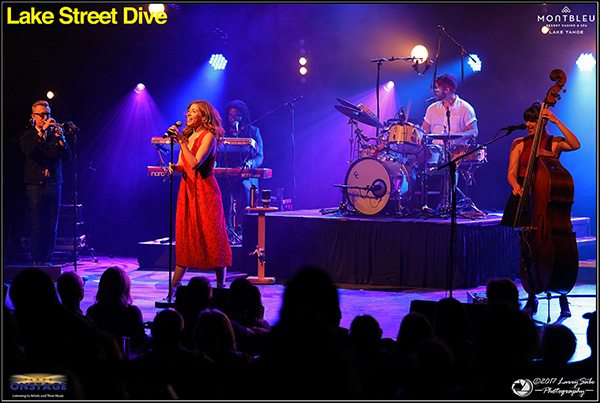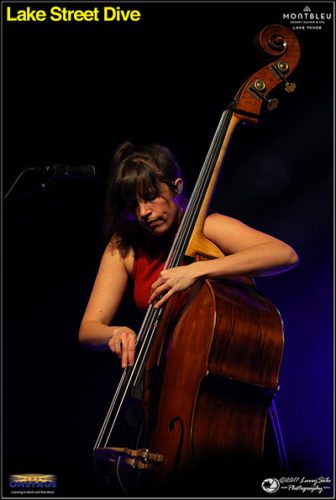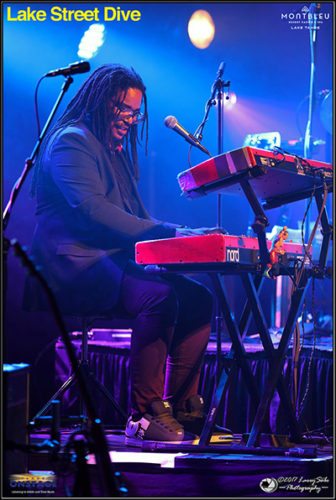
- This event has passed.
Lake Street Dive
June 2, 2018 @ 8:00 pm - 10:30 pm
$35 – $40
Lake Street Dive returns to the MontBleu Theatre at 8 p.m. Saturday, June 2. Mikaela Davis will open.
Lake Street Dive gets you feeling high when you put them on, there’s no two ways about it.
The Brooklyn-based quartet, which plays MontBleu Resort Casino & Spa on Saturday, June 2, first got together when Bridget Kearney (bass), Mike Calabrese (drums), Mike “McDuck” Olson (guitar) and Rachael Price (lead vocals) all met at New England Conservatory of Music, so we know they have some serious skills.
After their breakout album, “Bad Self Portraits,” T-Bone Burnett personally selected them (after a tip from Punch Brother’s fiddler and Dive friend Gabe Witcher) to perform at the “Another Day, Another Time: Celebrating the Music of ‘Inside Llewyn Davis,’ ” concert in New York City, a show in which they overshadowed A-listers such as Jack White, Joan Baez, Patti Smith and the Avett Brothers with a knockout performance, helping secure their first major label contract with Nonesuch Records.
So they’re some serious players, have serious backers and amaze other serious players in an underdog concert of a lifetime.
On top of that, these players have some killer songs. Go spin favorites “Bad Self Portraits” and “Call Off Your Dogs” back-to-back, then throw in “Good Kisser” from the group’s latest album “Free Yourself Up.” It’s pop perfection. Price, Olson, Calabrese and Kearney have a musical aesthetic that feels like a Jackson Pollock of the brightest colors of Motown, ’70s pop, AM radio and juke joint jazz, all sprayed and mixed together with a contemporary ear for what sounds good.
Price provides the wings-of-an-eagle soaring vocals that can be grand enough to fill a canyon and tender enough to warm your heart on a lonely evening. The music makes you want to dance, the singer makes you want to sing along every time, and it all hits you at once like a first kiss from a hot date.
Read below as Tahoe Onstage discussed Lake Street Dive’s new album “Free Yourself Up,” what their new keyboardist brings and playing live, with bassist Bridget Kearney. This conversation has been edited for length and clarity.
This was a self-produced album. What did you want to do different as a band this time around, production wise?
 We approached the production in a similar manner to past albums in terms of composition and arranging of songs, which is without a deliberate, stylistic thrust. We would write the song and use elements of different stylistic genres, but we are always trying to avoid something too specific. The drum sounds might imply something that’s in a whole different world from the guitar sounds or the vocal sounds or the keys sounds and hopefully they might make something unique.
We approached the production in a similar manner to past albums in terms of composition and arranging of songs, which is without a deliberate, stylistic thrust. We would write the song and use elements of different stylistic genres, but we are always trying to avoid something too specific. The drum sounds might imply something that’s in a whole different world from the guitar sounds or the vocal sounds or the keys sounds and hopefully they might make something unique.
Speaking of your own playing, what are you proud of on this record?
One of the things we were going for was capturing some of the live energy and the way we play together onstage. The way we did that is kind of counterintuitive. Instead of tracking in the same room together, where you might have to play a bit conservatively because if you make a mistake everyone has to play the song over, we all tracked in separate spaces from one another with headphones. We played in this reckless abandon kind of way, the way you can onstage when nothing is saved for all of history and you can take chances. You end up with more exciting performances that way and I think there are moments on the record where I can hear myself taking those chances and emerging victorious.
I think we did a lot of cool things with the bass sounds, a lot of sneaky studio tricks. Using pedals on certain sections or using bass doubles in a lot of places. A lot of using guitar to beef up the sound of the bass or using electric bass. Still making it sound like a standup bass, which it is, but finding ways to give it that power.
You added touring keyboardist Akie Bermiss to the band. What got him into the band and could you point to a song or moment on the album that epitomizes what he does for the band?
 We’ve oftentimes included keyboards in our records, but it would have been McDuck or I playing the keyboard parts and we are certainly not keyboard players. We took piano lessons as children and could play rudimentary keyboards, but Akie has so much more subtlety and nuance to his playing. On “Baby Don’t Leave Me Alone With My Thoughts,” just the way he voices the chorus right off the bat, he’s playing so melodically and maturely, we’ve never had that sound of a real keyboard player on our records before.
We’ve oftentimes included keyboards in our records, but it would have been McDuck or I playing the keyboard parts and we are certainly not keyboard players. We took piano lessons as children and could play rudimentary keyboards, but Akie has so much more subtlety and nuance to his playing. On “Baby Don’t Leave Me Alone With My Thoughts,” just the way he voices the chorus right off the bat, he’s playing so melodically and maturely, we’ve never had that sound of a real keyboard player on our records before.
Another thing is he is a great singer so he’s really added a lot to our background vocal sections as well, most obviously I think at the end on the song “Shame Shame Shame” when that rallying cry comes together. At first it’s just two voices, Rachael and Akie, and it’s almost a duet there.
You guys are just a week or so into the tour with this new record. What are ya’ll noticing as you guys start to work through the new songs?
It feels really fresh to have a bunch of new songs to play live. It’s cool that it seems people have been checking out this record even in this last week, they’ve been singing along. Especially the single “Good Kisser,” where everyone is shouting how much they are a good kisser (chuckles), which is fun to watch. We are letting some of those unique sections take their own life onstage, like that part in “Dude” at the end. It’s got the same energy but it’s gonna be different night to night because it is all improvised.
Is there an overall, overarching approach for playing live?
We all went to school for jazz together so improvisation is a big part of our live show. Rachel sings in an improvisational way, changing the way she performs each night from the last night. In the instrumental world, we are all listening to each other and bounce ideas back and forth. I think in this style of music is less common, that the musicians would have that improvisational background, so that’s something that is unique. I couldn’t give the same performance each night if I tried, that’s not how I think in my world.
– Garrett Bethmann
Details
- Date:
- June 2, 2018
- Time:
-
8:00 pm - 10:30 pm
- Cost:
- $35 – $40
- Event Tags:
- Lake Street Dive, MontBleu Casino Resort & Spa
- Website:
- https://www.montbleuresort.com/events
Organizer
- MontBleu Resort Casino & Spa
- Phone
- 775-588-3515
- View Organizer Website
Venue
- Bally’s Lake Tahoe
-
55 U.S. Highway 50
Stateline, NV 89449 United States + Google Map - Phone
- 775-588-3515
- View Venue Website
